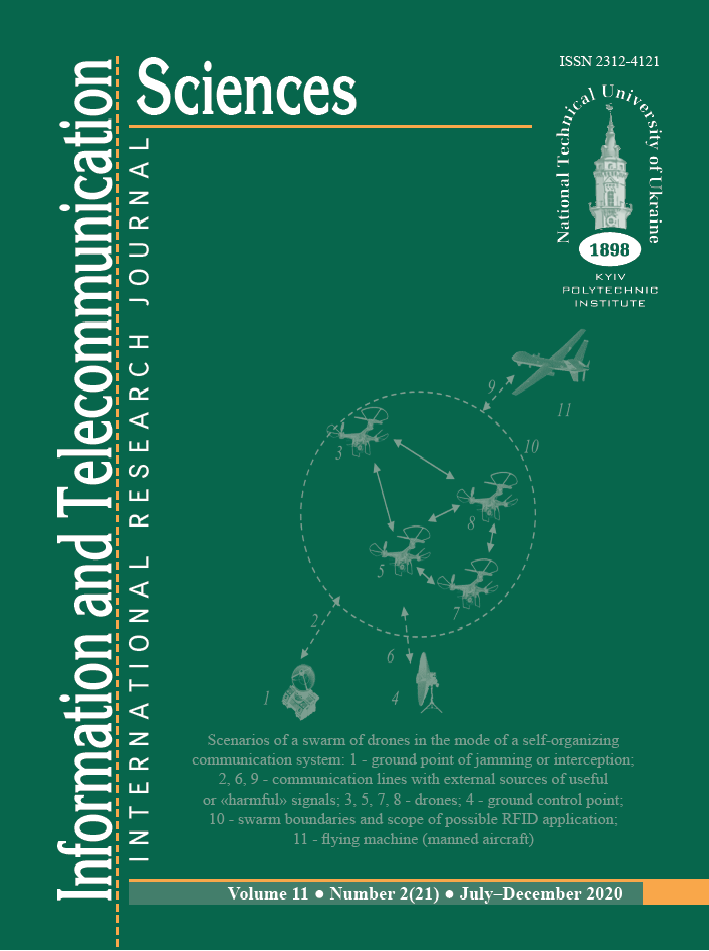FLOW-BASED ROUTING MODEL WITH LOAD BALANCING UNDER NETWORK SECURITY PARAMETERS
DOI:
https://doi.org/10.20535/2411-2976.22020.44-50Keywords:
routing, network, compromise, model.Abstract
Background. In modern telecommunication networks, the functioning of network protocols is aimed at achieving a high level of Quality of Service and network security. Therefore, an urgent scientific and applied problem is the adaptation of routing solutions with load balancing to the requirements of network security. The novelty of the proposed model is the modification of the load balancing conditions, in which, in addition to the link bandwidth (Quality of Service indicator), the probability of its compromise (network security indicator) is also taken into account. The routing solutions obtained within the framework of the proposed model are aimed at reducing the overload of network links that have a high probability of compromise by switching traffic to more secure links.
Objective. Developing the flow-based routing model with load balancing, which takes into account the parameters of network security.
Methods. Analysis of all known publications on load balancing and network security. Synthesis of a load balancing flowbased routing model. Study of the influence of network security parameters of communication links on routing and load balancing processes.
Results. A new condition for load balancing is proposed, which is a modification of the existing Traffic Engineering solution based on accounting the network security parameters - the probabilities of compromising communication links.
Conclusions. In routing with load balancing, parameters of network security should be considered. Depending on the network state and user requirements, different models of network security parameters for load balancing processes can be used.
References
Gupta S. Security and QoS in Wireless Sensor Networks
// 1st Edition. eBooks2go Inc. – 2018. – 134 p.
Kiser Q. Computer Networking and Cybersecurity: A
Guide to Understanding Communications Systems, Internet
Connections, and Network Security Along with Protection
from Hacking and Cyber Security Threats // Kindle Edition. –
– 122 p.
Revathi S., Geetha A. A survey of applications and
security issues in software defined networking // International
Journal of Computer Network and Information Security
(IJCNIS). – 2017. – Vol. 9(3). – pp. 21-28.
https://doi.org/10.5815/ijcnis.2017.03.03
Lemeshko O. V., Yevseyeva O. Y., Garkusha S. V. A
tensor model of multipath routing based on multiple QoS
metrics // 2013 International Siberian Conference on Controland Communications (SIBCON) Proceedings. – 2013. – pp.
-4. https://doi.org/10.1109/SIBCON.2013.6693645
Yeremenko O., Lemeshko O., Persikov A. Secure
routing in reliable networks: proactive and reactive approach
// Shakhovska, N., Stepashko, V. (eds.) CSIT 2017. AISC,
Springer, Cham. – 2018. – Vol. 689 – pp. 631–655.
https://doi.org/10.1007/978-3-319-70581-1_44
Shaik M. S., Mira F. A Comprehensive Mechanism of
MANET Network Layer Based Security Attack Prevention //
International Journal of Wireless and Microwave
Technologies (IJWMT) – 2020. – Vol. 10(1). – pp. 38-47
https://doi.org/10.5815/ijwmt.2020.01.04
Palani U., Amuthavalli G., Alamelumangai V. Secure
and load-balanced routing protocol in wireless sensor
network or disaster management // IET Information Security.
– 2020. – Vol. 14(5). – pp. 513-520.
https://doi.org/10.1049/iet-ifs.2018.5057
Patil M. V., Jadhav V. Secure, reliable and load
balanced routing protocols for multihop wireless networks //
International Conference on Intelligent Computing and
Control (I2C2) Proceedings. – 2017. – pp. 1-6.
https://doi.org/10.1109/I2C2.2017.8321936
Kumar N., Singh Y. Trust and packet load balancing
based secure opportunistic routing protocol for WSN // 2017
th International Conference on Signal Processing,
Computing and Control (ISPCC) Proceedings. – 2017. – pp.
-467. https://doi.org/10.1109/ISPCC.2017.8269723
Li S ., Zhao S., Wang X., Zhang K., Li L. Adaptive and
secure load-balancing routing protocol for service-oriented
wireless sensor networks // IEEE Systems Journal. – 2013. –
Vol. 8(3). – pp. 858-867.
https://doi.org/10.1109/JSYST.2013.2260626
Lemeshko O., Yeremenko O., Yevdokymenko M.,
Shapovalova A., Hailan A. M., Mersni A. Cyber Resilience
Approach Based on Traffic Engineering Fast ReRoute with
Policing // 2019 10th IEEE International Conference on
Intelligent Data Acquisition and Advanced Computing
Systems: Technology and Applications (IDAACS)
Proceedings. – 2019. – Vol. 1. – pp. 117-122.
https://doi.org/10.1109/IDAACS.2019.8924294.
Lemeshko O., Yeremenko O. Enhanced method of fast
re-routing with load balancing in software-defined networks
// Journal of Electrical Engineering. – 2017. – Vol. 68(6). –
pp. 444-454. https://doi.org/10.1515/jee-2017-0079
Lemeshko O., Yeremenko O. Linear optimization
model of MPLS Traffic Engineering Fast ReRoute for link,
node, and bandwidth protection // 2018 14th International
Conference on Advanced Trends in Radioelecrtronics,
Telecommunications and Computer Engineering (TCSET)
Proceedings. – 2018. – pp. 1009-1013.
https://doi.org/10.1109/TCSET.2018.8336365
Mendiola A., Astorga J., Jacob E., Higuero M. A survey
on the contributions of Software-Defined Networking to
Traffic Engineering // IEEE Communications Surveys &
Tutorials. – 2017. – Vol. 19(2). – pp. 918-953.
https://doi.org/10.1109/COMST.2016.2633579
Vanderbei R. J. Linear programming: foundations and
extensions // Springer Nature. 2014. – Vol. 285. – 414 p.
Downloads
Published
How to Cite
Issue
Section
License
The ownership of copyright remains with the Authors.
Authors may use their own material in other publications provided that the Journal is acknowledged as the original place of publication and National Technical University of Ukraine “Igor Sikorsky Kyiv Polytechnic Institute” as the Publisher.
ITS articles are published under Creative Commons licence:
- Authors retain copyright and grant the journal right of first publication with the work simultaneously licensed under CC BY 4.0that allows others to share the work with an acknowledgement of the work's authorship and initial publication in this journal.
- Authors are able to enter into separate, additional contractual arrangements for the non-exclusive distribution of the journal's published version of the work (e.g., post it to an institutional repository or publish it in a book), with an acknowledgement of its initial publication in this journal.
- Authors are permitted and encouraged to post their work online (e.g., in institutional repositories or on their website) prior to and during the submission process, as it can lead to productive exchanges, as well as earlier and greater citation of published work.

